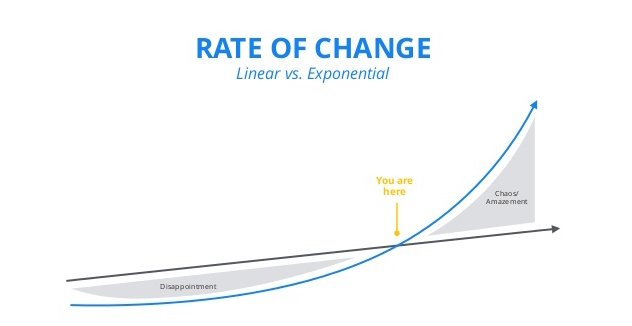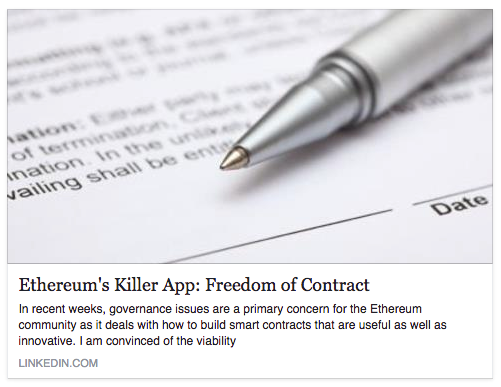Rule of law 2.0 - Towards a definition
With the automation of law[1, 2, 3], what we really need for the next 5 to 10 years, is to describe what "rule of law 2.0" would look like. Lawyers understand law and the subtlety of legal mechanisms in ways that most people do not, and so could translate to them what "rule of law 2.0" could look like.
Bitnation, or maybe it was Tim O´Reilly first [4], defined governance 2.0 as "voluntary, borderless, decentralized", and "rule of law 2.0" would how I see it be voluntary, borderless and decentralized as well. Universal access to private law, if private law is competitive with civil law and performs better, would be exactly that.
"Done well, smart contracts will unlock for everyday users the wonders of private law previously only available to the rich. " - Nina Kilbride
Law is becoming an information technology
Law is becoming an information technology, and as that happens it starts to evolve based on Ray Kurzweil's "law of accelerating returns".[5] Nick Szabo described law-as-a-technology in broad terms in 1997 with Formalizing and Securing Relationships on Public Networks, and then Bitcoin pioneered an early form of "distributed virtual state" in 2009, which later evolved with Ethereum in 2014. Tau Chain, rChain, BitLattice and Polkadot appeared in 2015 - 2017.
Law as a technology, and part of an "exocortex"[6], is still in the deceptive phase, and about to go exponential.

Defining law as an extension of the human brain, as a foundation for Rule-of-law 2.0
In 5 - 10 years, the processing capacity of distributed virtual states could exceed the nation-state, and most rule of law would then be processed on these "networked states". The role of those who practice and understand law would be to describe how the world changes with universal access to private law.
If law is an extension of the human brain, a cybernetic extension, what I call "the third extension of the human organism", [7, 8] extensions of social functions, where Marshal McLuhan described the first and the second as physical tools and cognitive appendages, then decentralized law through universal access to private law, or what could also be called "sovereign law", would provide a much better foundation for rule of law than the nation-state and civil law ever could.
That could be defined as "rule of law 2.0". I believe it could appeal to everyone. If my theory around the Resilience protocol holds up, then it fills in a missing piece in how to do for example welfare functions, dividend pathways would provide a decentralized environment for that which has not been able to solve with private law in the past.

Synapses
New Report Predicts Over 100,000 Legal Jobs Will Be Lost To Automation
Ethereum, blockchain, and smart contracts – the future of law? - New Zealand Law Society
Arizona Gives Legal Status to Blockchain Based Smart Contracts - Trustnodes
Gov 2.0: It's All About The Platform - Techcrunch (Tim O´Reilly, 2009)
The accelerating power of technology - TED (Ray Kurzweil, 2005)
Thinking Outside the Brain – Why We Need to Build a Decentralized Exocortex - Backfeed Magazine
